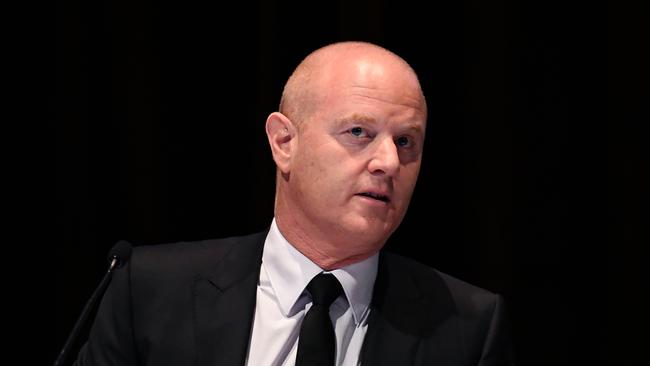Seek sees profit dip on shifting jobs market as it warns of higher unemployment, smaller pay rises
Investors are dumping shares in Seek as the end of a jobs boom hits its profit and it warns a shift in the labour market is likely to be bad news for those after a big pay rise.
Online employment company Seek warns that more Australians will lose their jobs and fewer employers will look to recruit staff in the year ahead as the flow on effect of the Reserve Bank’s aggressive run of rate rises works its way through the economy.
A shift in the labour market from favouring workers to a more balanced one is also likely to mean that employees won’t see wages rise at the rate of current levels, according to Seek.
Seek expects the weakening economy is likely to result in a further moderation in its profit throughout the 2024 financial year after seeing a 1 per cent decline in adjusted profit from continuing operations to $255m for the 12 months to June 30 from $256.8m a year earlier.
The profit result was 2 per cent more than market consensus, although lower guidance than expected for 2024 driven by higher capex saw investors sell down Seek on Tuesday with shares down 4.3 per cent to $24.66.
Seek was seeing higher applications per ad from 2022 driven by increased candidate interest from a surge in immigration and lower job ad volumes. Figures were comparable to labour conditions last seen in May 2019.
Chief executive Ian Narev said Australia was heading towards a “healthier’ jobs market that offered something for both employers and employees.
“We are pretty close to what we would consider to be a pre-Covid labour market albeit a little above that,” he said. “Companies are having a much easier time finding workers currently than as recently as six months ago.”
Data from the Australian Bureau of Statistics on Tuesday showed that the Wage Price Index rose 3.6 per cent for the year to June – less than the 3.8 per cent increase in March, which was the best since 2012. This followed on from a near 50-year low unemployment rate in June of 3.5 per cent.
The shift to a more balanced labour market would mean that workers were likely to not see their pay increase by as much as current levels, Mr Narev said.
“In the market overall it is getting easier for employers to find workers which doesn’t mean that wages will go down, they just won’t rise as steep as what we are seeing now,” he said.

Minutes from the RBA’s August meeting showed that the board was of the view that slower growth in wages was likely to be required for inflation to return to its 2-3 per cent target. The central bank expects that wages will rise by 4 per cent this year before slowing to 3.5 per cent by the end of 2025.
The RBA has forecasted unemployment to reach 4 per cent by year’s end and 4.25 per cent in next June.
Seek has seen the largest decline in jobs ads for work in the IT sector with the largest increase in the education and accounting sectors. All Australian states except Queensland and Tasmania registered a decline in job ads with Victoria the worst from a year ago.
This past year saw Seek change its reported non-IFRS profit measure from reported profit after tax, excluding significant items to adjusted profit after tax. Without that adjustment, Seek reported that profit fell 16 per cent to $240.8m.
Earnings before interest, taxes, depreciation and amortisation rose 7 per cent to $546.1m, less than the $560m it had guided. Annual revenue rose 10 per cent to $1.23bn, slightly behind its $1.25bn forecast.
“Top line was under what we had thought would happen, but we are in a changing environment and need to accept that it will be like this for some time,” Mr Narev said.
The chief executive added that while some investors disagreed with large spending on its platform unification project when revenue was weaker, he said that the project would set the company up for a generation and allow it to just focus solely on innovation from early 2024.
Seek expects revenue of between $1.2bn and $1.3bn for the 2024 financial year, with EBITDA to be $520m-$560m and adjusted profit after tax of $220m-$260m.
Mr Narev said guidance was based on higher unemployment and a decline in job ad volumes across Australia and New Zealand.
eToro market analyst Josh Gilbert said that Seek’s full year guidance for 2024 showed that it was going to be a tricky period ahead for the company and the economy.
“A rise in unemployment could be a silver lining for the online marketplace if it can continue to attract employers with its raft of job seekers, but its full-year guidance shows it’s going to be a tricky period,” he said.
“The result was a miss across the board from Seek, with few positives for investors to take away, which is why we are seeing shares free-fall.”
Seek will pay a final dividend of 23c a share, taking its full year payout to 47c per share.






To join the conversation, please log in. Don't have an account? Register
Join the conversation, you are commenting as Logout